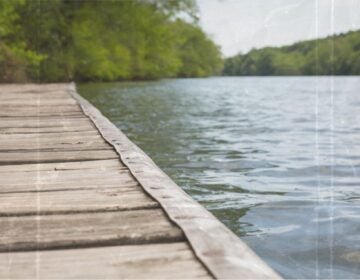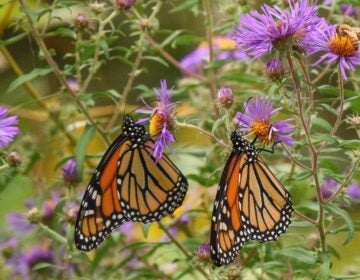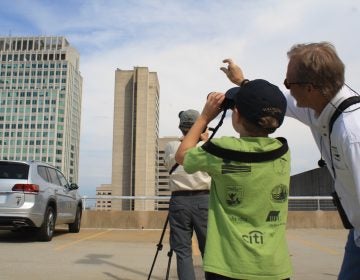‘Riotous explosion of life’ awaits birding newbies in this stay-at-home era
Walking outdoors is allowed. The American Birding Association has tips to help start you on a hobby.
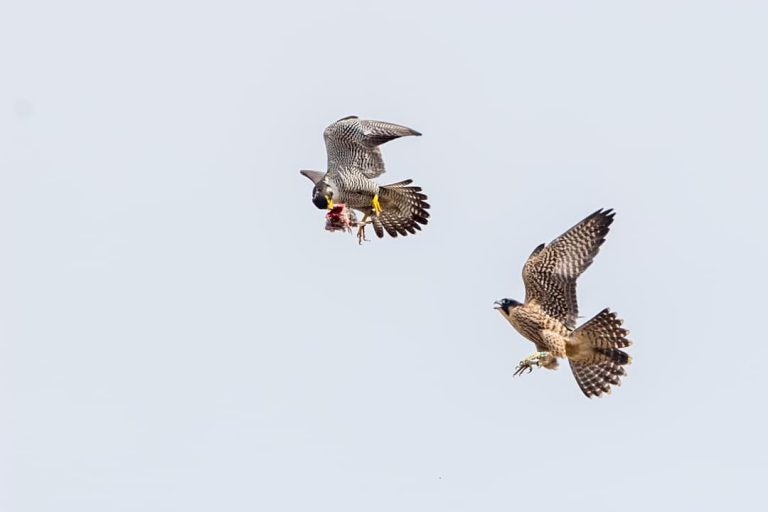
Falcons soar through the sky above downtown Wilmington. The birds were closely monitored by dozens of bird watchers as part of the Delaware Ornithological Society’s 12th annual falcon watch. (Courtesy Jerry am Ende/Delaware Ornithological Society)
Go outside. Get some exercise. Take a walk.
It’s often-repeated advice for those of us stuck at home — it’s just about the only approved leisure activity. And if there’s anything positive about the timing of these stay-at-home orders, it’s that they’re happening as nature is exploding with color and other changes that offer a welcome distraction from weeklong Netflix binges.
While everything that’s normal in our lives has been canceled, postponed or done remotely, nature carries on. For some people, this is a chance to combat the invasive spotted lanternfly. For Jeffrey Gordon, president of the American Birding Association, it’s a perfect time to slow down and appreciate our feathered friends.
“All these things that are our normal rhythms, for a lot of us, just feel like they’re all haywire. Birds are just keeping on,” Gordon said. “We’re all here to get through this together and make the best of it, and birds and nature are a part of that.”
Gordon leads the birding association from its headquarters in Delaware City. Though the association has had to cancel trips and has lost advertising revenue for its publications, Gordon sees a silver lining in more people discovering the outdoors and maybe birding as a new hobby.
“It’s a time-tested way of putting things back in perspective and realizing that life does go on and will go on. It feels like a perfect fit,” he said.
For the uninitiated, birding couldn’t be simpler. Just step outside or take a walk through the neighborhood and keep your eyes and ears open.
“Don’t neglect your doorstep,” Gordon said. “If you have an opportunity for some kind of feeder, even putting out a little tray of water on an apartment window could bring some birds in.”
Having a place where birds can clean their feathers in an area that is protected from predators is a great way to get a close encounter of the feathered kind, he said. “You might be rewarded with some great views of birds bathing, and that sounds pretty Zen right there.”
It doesn’t require expensive binoculars or camera equipment. You can see plenty of action with the naked eye, especially during early spring.
“Right now is a time of high drama,” Gordon said. “The American robins I’m seeing, they’re all in these pitched battles for territory and for mates, and I’m seeing males battling each other, smacking each other with their wings, multiple males chasing a female, kind of this riotous explosion of life, literally at the doorstep.”
Though the birding association has between 10,000 and 12,000 actual members, 40,000 people have joined its “What’s This Bird” Facebook group. In the group, newbie bird-watchers can get help identifying birds they’ve seen.
“Looking for resources like that is a great thing to do,” Gordon said.
He also recommended apps like iNaturalist or Cornell Lab of Ornithology’s Merlin to help identify birds, insects and other wildlife. He said birders are pretty active on social media sites like Twitter and Instagram, and most states have birding groups on Facebook that can help beginners identify what they see.
“There’s groups of people out there who are ready to be resources to either suggest things to watch for or listen for, or help you understand and know what you saw.”
Gordon is optimistic that having lots of people forced indoors will create new habits and an increased appreciation for birds and their habitat.
“I think some folks are going to find that they’ve kind of awakened a taste for birding and paying attention to nature that they’re actually going to find sustaining and fulfilling even when coronavirus is a distant memory.”
WHYY is your source for fact-based, in-depth journalism and information. As a nonprofit organization, we rely on financial support from readers like you. Please give today.




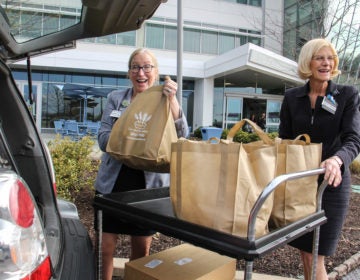
![CoronavirusPandemic_1024x512[1]](https://whyy.org/wp-content/uploads/2020/03/CoronavirusPandemic_1024x5121-300x150.jpg)
